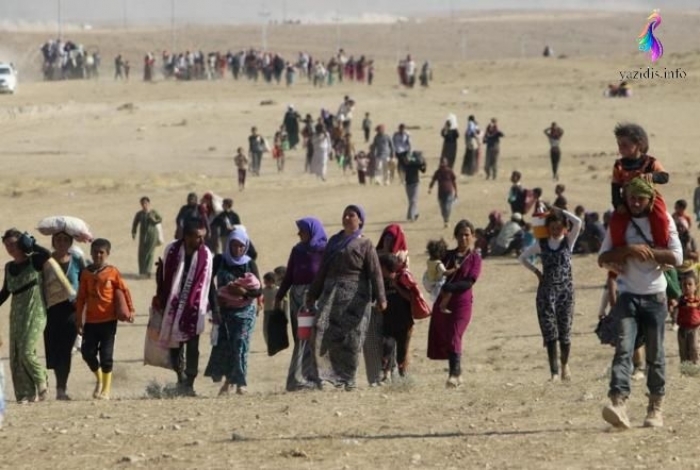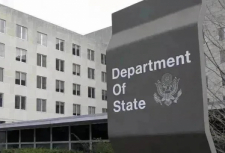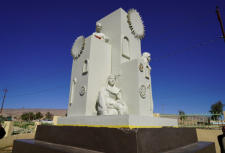Obstacles to the return of the missing yazidis

Part-2
Trafficking in Human Beings:
In addition to the trade of selling enslaved Yazidis among ISIS elements, the group has created a lucrative industry that forces Yazidi families to pay huge sums of money as ransom to return their kidnapped family members. As the prices demanded by members of the organization have risen over time from around $ 500 to $ 20,000 or more, families also often must pay a network of middlemen and smugglers to enable the return. Families have been tricked into paying individuals to obtain information about the whereabouts of their missing relatives, so that those individuals would disappear before this information was provided. Families are often in a difficult economic situation because of displacement and must borrow money to pay for their release. The huge profits made from this are discouraging the kidnappers from freeing the Yazidis.
Misidentification and affiliation with ISIS:
One of the main obstacles to the return of the captured Yezidis is the misidentification of them. As part of their attempt to eliminate the ethnic Yazidi religion, ISIS detainees indoctrinated their faiths, taught them that the Yazidis were infidels and told them that the Yazidi community would not accept them if they returned. As a result, many in captivity were no longer identified as Yezidis. In camps like Al-Hol camp, Yazidis do not always know that they can, or feel safe enough, to approach those who run the camp and identify themselves as Yazidis to get them released. Yazidis may have Arabic names, speak only Arabic, and wear the niqab, which makes identification difficult. Many other people in the camp retain a strong ISIS affiliation and thus identifying themselves as Yazidis may risk their lives.
Adults and young males who were forced to fight with the Islamic State group as a punishment for taking up arms, may be detained because of their presumed affiliation with ISIS and without acknowledging that this was not by choice. For the same reasons, they may not be able or unwilling to identify themselves as Yezidis.
Unique challenges facing children:
Some children were very young when they were kidnapped or were born in captivity. Physical development over time makes them difficult to recognize. The Islamic State's indoctrination has turned children against the Yezidi identity, and children can resist any contact with other Yazidis or re-establish contact with families. For boys, this is exacerbated by the profound psychological impact of fighting on the frontlines.
Many Yazidi women have given birth to children from ISIS operatives because of sexual violence. As some of the families of these women are not ready to accept these children because they were born to ISIS fighters because this contradicts the laws of the Yazidi religion and the Iraqi law is also not in favor of the families of these women, so mothers make the difficult decision not to return to Iraq to stay with their children.
Tags:
Obstacles to the return of the missing yazidis

Part-2
Trafficking in Human Beings:
In addition to the trade of selling enslaved Yazidis among ISIS elements, the group has created a lucrative industry that forces Yazidi families to pay huge sums of money as ransom to return their kidnapped family members. As the prices demanded by members of the organization have risen over time from around $ 500 to $ 20,000 or more, families also often must pay a network of middlemen and smugglers to enable the return. Families have been tricked into paying individuals to obtain information about the whereabouts of their missing relatives, so that those individuals would disappear before this information was provided. Families are often in a difficult economic situation because of displacement and must borrow money to pay for their release. The huge profits made from this are discouraging the kidnappers from freeing the Yazidis.
Misidentification and affiliation with ISIS:
One of the main obstacles to the return of the captured Yezidis is the misidentification of them. As part of their attempt to eliminate the ethnic Yazidi religion, ISIS detainees indoctrinated their faiths, taught them that the Yazidis were infidels and told them that the Yazidi community would not accept them if they returned. As a result, many in captivity were no longer identified as Yezidis. In camps like Al-Hol camp, Yazidis do not always know that they can, or feel safe enough, to approach those who run the camp and identify themselves as Yazidis to get them released. Yazidis may have Arabic names, speak only Arabic, and wear the niqab, which makes identification difficult. Many other people in the camp retain a strong ISIS affiliation and thus identifying themselves as Yazidis may risk their lives.
Adults and young males who were forced to fight with the Islamic State group as a punishment for taking up arms, may be detained because of their presumed affiliation with ISIS and without acknowledging that this was not by choice. For the same reasons, they may not be able or unwilling to identify themselves as Yezidis.
Unique challenges facing children:
Some children were very young when they were kidnapped or were born in captivity. Physical development over time makes them difficult to recognize. The Islamic State's indoctrination has turned children against the Yezidi identity, and children can resist any contact with other Yazidis or re-establish contact with families. For boys, this is exacerbated by the profound psychological impact of fighting on the frontlines.
Many Yazidi women have given birth to children from ISIS operatives because of sexual violence. As some of the families of these women are not ready to accept these children because they were born to ISIS fighters because this contradicts the laws of the Yazidi religion and the Iraqi law is also not in favor of the families of these women, so mothers make the difficult decision not to return to Iraq to stay with their children.
Tags:


























